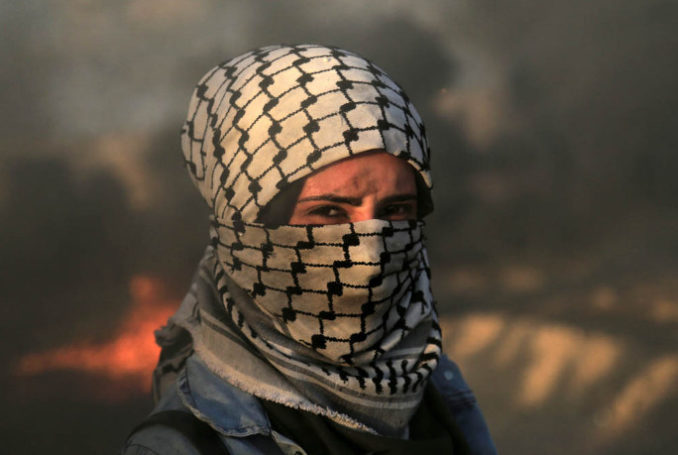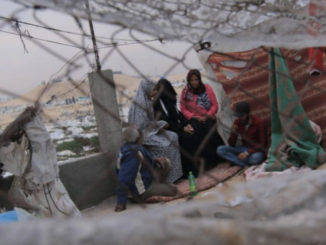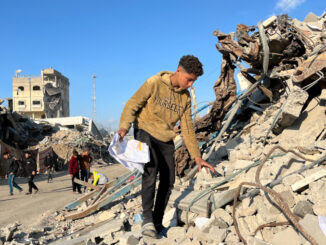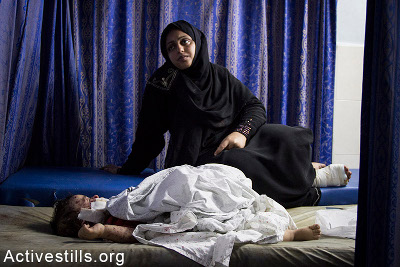
Women's participation was high during the Great March of Return and many women are at the forefront of the demonstrations. More than 100 women were injured by live ammunition during the first six months of protest and one was killed - Photo: Mohammed Zaanoun / Active Stills / Al Jazeera
Par Samah Jabr
The village lay in a quiet valley, surrounded by olive groves and rolling hills. For weeks, the men had stood at its borders, determined to protect their home. They knew they were outmatched, that their weapons were no match for the foreign army that loomed beyond the horizon. Yet, they fought as long as they could, believing that even a brief resistance was better than surrender.
But the enemy was relentless. One by one, the defenders fell, their bodies left scattered at the village’s edge. And when the last of them was struck down, the path was open.
The invaders entered at nightfall. They did not come only to conquer—they came to break the spirit of those who remained. They moved through the village methodically, stepping over the fallen, their torches casting long shadows on the stone walls.
They went first to the home of Sheikh Darwish, the village leader. His daughters were known for their beauty and grace, and the invaders took what they wanted. The women’s cries filled the night, but there was no one left to stop them.
From there, the soldiers spread through the village, entering homes where only women and children remained. Doors were kicked open, families were torn apart, and dignity was trampled underfoot. Some women wept in silence, others fought back, but resistance only brought harsher punishment.
Then they reached the last house.
Inside lived Salma, a woman who had been widowed years before. She had no brothers, no father, no sons—no men to protect her. When the soldiers entered, she was waiting, standing in the center of the room, her hands steady.
The leader of the unit, a tall man with a scar across his face, stepped forward. He had seen terror in many forms, but the calm in her eyes unsettled him.
“You are alone,” he said.
Salma did not answer.
He smirked. “You know why we are here.”
Still, she did not move.
He reached for her, certain that she, like the others, would crumble in fear. But the moment his hand extended, she struck.
It was over in seconds. The blade she had hidden flashed in the dim light, and he staggered back, gasping. His hand flew to his throat, trying to stop the life from leaving him. The other soldiers froze, watching in stunned silence as their leader collapsed at her feet.
Salma did not run. She did not cower. She faced them, her grip firm on the weapon. The soldiers, shaken by what they had seen, hesitated. Then, one by one, they turned and fled into the night.
When the village emerged from hiding, they found the fallen soldiers outside her home, and they found Salma—standing untouched, unbowed.
At first, there was relief. Then there was silence.
She had survived.
She had not been taken.
And with that survival came a discomfort no one could name.
The men, who had fought and failed, avoided her gaze. The women, who had suffered, could not bear to look at her. Even the elders, who had long guided the village, had no words.
The whispers began.
“How did she escape when no one else did?”
“Why was she left untouched?”
“Did she make a deal with them?”
Her courage, instead of inspiring, became an accusation. Her survival, instead of being a victory, became a burden on the rest. She had done what no one else could. And for that, they could not forgive her.
So, they gathered in secret and made a decision.
Before dawn, they came for her. This time, it was not the enemy at her door—it was her own people. They led her to the outskirts of the village, to the place where their fallen lay.
She did not protest.
She did not plead.
She stood before them as she had stood before the enemy—with her head high and her silence unbroken.
And when the first stone was lifted, no one dared meet her eyes.
* Dr. Samah Jabr is a consulting psychiatrist practicing in Palestine, serving the communities of East Jerusalem and the West Bank, and former head of the mental health unit within the Palestinian Ministry of Health.
She is an associate clinical professor of psychiatry and behavioral sciences at George Washington University in Washington, DC.
She is also a member of the scientific committee of the Global Initiative against Impunity (GIAI) for International Crimes and Serious Human Rights Violations, a program co-financed by the European Union.
February, 28, 2025 – Transmitted by the author – French version



